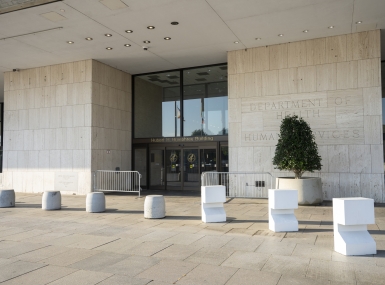HHS expands and strengthens the community and public health workforce with new ARPA funding
Author

Blaire Bryant
Upcoming Events
Related News

Key Takeaways
On September 30, the U.S. Department of Health and Human Services (HHS), through the Health Resources and Services Administration (HRSA), awarded more than $266 million in American Rescue Plan (ARPA) funding to grow the community and public health workforce. The funding is being made available to grantees through two HRSA-administered grant programs: the Community Health Worker Training Program and the Public Health Scholarship program.
HRSA is awarding $225.5 million to 83 grantees as part of the Community Health Worker Training Program (CHWTP), which is a new multiyear program that will support training and apprenticeship to support an estimated 13,000 community health workers (CHWs). CHWs are trusted community members that work to connect people to culturally appropriate care, give informal counseling and guidance on health behaviors and facilitate communication between patients and health care providers. In some counties, CHWs can be known as promotores de salud, community health advisors, outreach workers, patient navigators and peer counselors.
CHWTP is meant to equip CHWs with the skillsets needed to provide effective community outreach, build trust with communities, support connections to and retention in care and support services and other strategies to increase access to care and to assist individuals in prevention services. Efforts by CHWs are critical to advancing public health, strengthening the public health workforce, reducing health disparities and helping underserved populations achieve health equity.
HRSA is also awarding $40.7 million to 29 grantees through the Public Health Scholarship Program (PHSP), which will incentivize individuals to pursue training and careers in public health, including as epidemiologists, social support specialists, public health nurses, disease intervention specialists, program managers, laboratory personnel and other positions critical to community public health needs. Awarded recipients will provide scholarships to individuals, for the purpose of public health training in professional, graduate, degree and/or certificate programs. This program will help build a public health workforce with the skills and capacity to prevent, prepare for and respond to recovery activities related to COVID-19, as well as other public health emergencies and ongoing community health issues.
Read the full announcement here.
As owners and operators of the local healthcare safety net system, counties are invested in building a workforce that can provide equitable care for vulnerable residents, while responding to ongoing public health threats. NACo supports federal investments in programs that help to recruit, train, license and retain health care professionals in order to expand and diversify the local health workforce.
ADDITIONAL RESOURCES
Resource
Counties and the American Rescue Plan Act Recovery Fund: Public Health Infrastructure

Related News

U.S. Department of Health and Human Services announces major restructuring
On March 27, the U.S. Department of Health and Human Services (HHS) announced a sweeping reorganization that will consolidate agencies, shift key programs under a new framework and eliminate thousands of positions. This change brings HHS in line with President Trump's Executive Order, “Implementing the President’s ‘Department of Government Efficiency’ Workforce Optimization Initiative.”

U.S. Department of Health and Human Services moves to reduce public comment in rulemaking
On February 28, the U.S. Department of Health and Human Services (HHS) announced a policy change limiting public comment opportunities to only those required by law. Published in the Federal Register on March 3, the decision rescinds the “Richardson Waiver,” a 1971 directive from then-HHS Secretary Elliot Richardson that encouraged broader public input on regulations related to public benefits, grants and healthcare policies.

U.S. Department of Health and Human Services renews Public Health Emergency Declaration to address national opioid crisis
On March 18, the U.S. Department of Health and Human Services (HHS), under the direction of Secretary Robert F. Kennedy, Jr. renewed the public health emergency (PHE) declaration to address the ongoing opioid crisis, extending critical federal support for coordination, treatment expansion and research efforts. While overdose deaths have declined by 25.5 percent over the past year, synthetic opioids like fentanyl continue to drive fatalities, with approximately 150 Americans dying daily from overdoses.